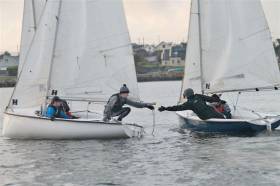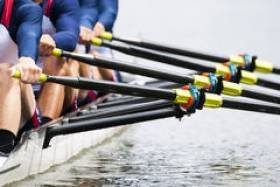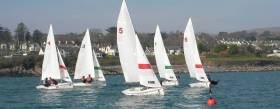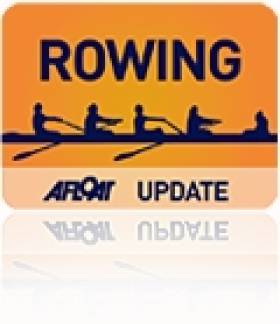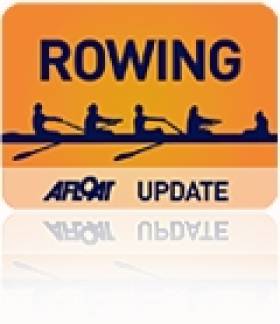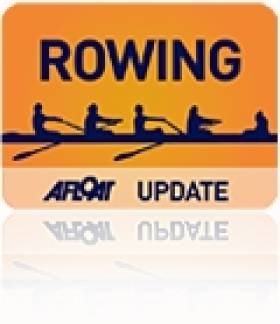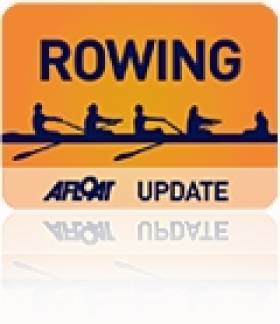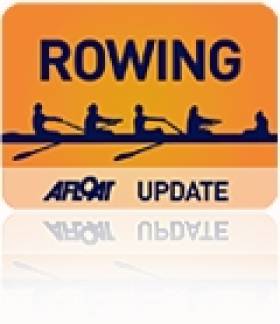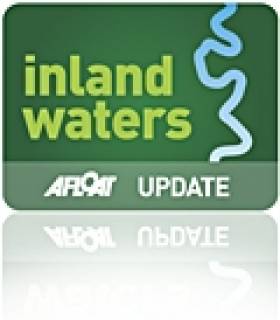Displaying items by tag: Schools
Irish Schools and University Championships Cancelled
#Rowing: Powerful winds and very choppy water forced the cancellation of the Irish Schools and University Championships at Lough Rinn today.
The early part of the programme went ahead, but after two hours of action, the conditions had deteriorated with no prospect of improvement. Boats were taking on water and some rowers had fallen in.
A decision on the Lough Rinn regatta tomorrow (Sunday) will be made later today. It is likely to go ahead, but may have some alterations to the schedule.
St Enda’s College Win Connacht Schools Team Racing Championship
For the second year in a row, Comhghairdeas Coláiste Éidne (St Enda’s College) Galway won the Connacht Schools Team Racing Championship on Sunday 3 March in Carraroe, hosted by Cumann Bádóireachta agus Seoltóireachta.
Six teams from in and around Connacht were able to make the event despite the postponement of racing to Sunday due to westerly gale force winds hammering the bay on Saturday.
The schools included St Enda’s, Athlone Community Marist College Athlone, Calasanctius Oranmore and host school Scoil Cuimsitheach Chiaráin Carraroe.
Every team got to race each other in a full fleet of Fireflies, and St Enda’s were delighted to come away with the win up against strong challengers in Athlone Community College and Marist College Athlone, who placed second and third respectively.
The top three teams now go through the Schools National Team Racing Finals hosted by Schull Community School on the weekend of 4-5 May.
St Joseph's of Galway Trophy Winners at Schools' Championships
#Rowing: The Victor Ludorum Trophy for best school was won by St Joseph’s of Galway at the Irish Schools’ Championships at O’Brien’s Bridge in Clare today. Daire Lynch of Clonmel CBS was the best single sculler. Methodist College, Belfast, won the women’s under-23 eight.
USA Crews Line Up for Inaugural International Schools Team Racing Championships in Schull
The inaugural International Schools Team Racing Championships will take place in Schull, West Cork from the 18th –20th March.
16 teams are entered, with Tabor Academy and Cape Cod Academy sending four teams from the USA arriving on the 16th, in time to take part in the Schull St Patricks Day parade with the Schull teams.
The international event has developed from Schull Sailing Teams traveling every two years since 2007 to visit US schools in the New England area, hopefully this will be a biennial event.
Four teams are coming from the UK, including Sevenoaks, Tonbridge, James Alexander Gordon and Burford schools.
The American schools are doing home stay with the Schull sailors.
Eight teams are entered from Ireland, mainly from Munster with one team from the RstGYC.
#ROWING: Christian Brothers College and Cork Boat Club today signed a joint Memorandum of Understanding at the College in a signing ceremony which moves the longstanding close relationship between the College and the rowing club to a more formal basis.
This follows the recent decision by Christians Brothers College Board of Management to invest in rowing boats and equipment to enhance the facilities available to its students, and to work closely with Cork Boat Club to take advantage of the excellent coaching and training facilities at the club.
The chief executive of Rowing Ireland, Hamish Adams, attended the signing of the agreement between Christian Brothers College and Cork Boat Club and said “Rowing Ireland is delighted to endorse this joint initiative between Cork Boat Club and Christian Brothers College. Such a positive relationship advancing Schools and Club rowing through one of the most successful Clubs in the country is very innovative and encouraging for the future of our sport.”
Dr. Larry Jordan, Principal of Christian Brothers College, added: “We are delighted to work closely with Cork Boat Club to avail of the excellent equipment, facilities and coaching at the club. Their ethos and ours are very complimentary and the relationship has allowed the college to develop rowing as a sport, as a result of which the College is already competing well at schools competitions both in the UK and Ireland. Many of our past rowers have gone on to row at university level and at the highest levels of rowing both nationally and internationally and are sources of great pride for the College.”
Karen McCarthy, Captain of Cork Boat Club, said: “We are very focused on developing schools rowing, and in fact supported six different schools at the recent Schools Rowing Championships with boats and coaches. The relationship with Christian Brothers College has been a very positive one and we are delighted to now work more closely with the College to develop deep rowing talent in the coming months and years.”
Cork Boat Club is the largest rowing club in Cork City and in 2014 won seven national rowing championships. In 2014 it also had the distinction of being the club with the most rowers selected to represent Ireland in various international competitions.
Great Day for Enniskillen at Irish Schools Regatta
#ROWING: Two schools from Enniskillen took some of the major honours on offer at the Irish Schools Regatta at O’Brien’s Bridge. Enniskillen Collegiate won the women’s under-23 eights, fours and pairs, and Portora Royal School won the under-23 eights and pairs. Presentation Brothers College, Cork, took the men’s coxed fours. Waterpark College’s Andrew Goff was the top single sculler, and Sarah Murphy of Gaelcholáiste Luimnigh the top women’s sculler.
Irish Schools Regatta 2015, O’Brien’s Bridge, Selected Results
Men
Eight – Under-23: 1 Portora, 2 St Joseph’s, 3 Presentation, Cork. Junior 16: 1 St Joseph’s, 2 Col Iognáid, 3 Presentation, Cork. Jun 15: 1 St Joseph’s, 2 Pres, Cork, 3 Portora.
Four – Under-23, coxed: 1 Pres, Cork, 2 St Joseph’s, 3 CBS, Cork. Jun 16: 1 Portora, 2 Col Iognáid, 3 St Joseph’s B. Junior 15, coxed: 1 St Joseph’s A, 2 Portora, 3 Presentation Cork.
Pair – Under-23: 1 Portora A, 2 St Joseph’s B, 3 Ardscoil A.
Sculling
Quadruple – Under-23: 1 Schull CS, 2 Methody, 3 CBC, Cork. Junior 16, coxed: 1 Ardscoil A, 2 Methody, 3 Killorglin. Jun 15, coxed: 1 CBC Cork A, 2 CAI, 3 Methody.
Double – Under-23: 1 Schull CS A, 2 Marist, 3 Summerhill. Junior 16: 1 Rochestown, 2 Methody, 3 Pres, Carlow. Jun 15: 1 St Mary’s, Carlow, 2 CBC, Cork, 3 Castleknock.
Single – Under-23 (Final One, Timed): 1 Waterpark (A Goff), 2 St Munchin’s (Carmody), 3 Rochestown (Larkin). (Final Two, Timed): Portora (Murray). Jun 16: 1 Castleknock (Meehan), 2 Rochestown (Larkin), 3 Ardscoil Dub (Lynch). Jun 15 – Final One: 1 St Mary’s, Carlow (J Keating), 2 Carrigaline CC (S O’Neill), 3 CBC (T Murphy). Final Two: Ardscoil (O’Byrne).
Women
Eight – Under-23: 1 Enniskillen, 2 Laurel Hill, 3 Mount Lourdes. Jun 16: 1 Col Iognáid, 2 Methody, 3 Laurel Hill. Jun 15: 1 Col Iognáid, 2 Enniskillen
Four – Under-23: 1 Enniskillen, 2 Mount Lourdes. Jun 16, coxed: 1 Col Iognáid B, 2 Enniskillen, 3 Col Iognáid A. Jun 15, coxed: 1 Col Iognaid, 2 Mount Lourdes.
Pair – Under-23: 1 Enniskillen, 2 Laurel Hill B, 3 Laurel Hill A.
Sculling
Quadruple – Under-23: 1 St Leo’s, 2 Loreto, Fermoy A, 3 Loreto, Fermoy B. Junior 16, coxed: 1 Gaelcholáiste Cheatharlach, 2 Regina Mundi, 3 St Leo’s. Jun 15: 1 Loreto, Fermoy A, 2 Christ the King, Cork, 3 St Brigid’s A.
Double – Under 23 (Final One, Timed): 1 St Angela’s, Cork, 2 Methody, 3 Ursuline, Sligo. Final Two, timed: Sacred Heart. Final Three, timed: St Leo’s B. Jun 16: St Dominic’s, 2 Sacred Heart, 3 Christ the King A. Jun 15: 1 Regina Mundi, 2 Loreto, Fermoy, 3 St Louis.
Single – Under-23: 1 Gaelcholáiste Luimnigh (S Murphy), 2 Christ the King (Cummins), 3 Methody (Deyermond). Junior 16: Scoil Mhuire (Synnott), 2 Loreto Fermoy (O’Sullivan). Jun 15 (Final One): Loreto, Fermoy (Murphy). Final Two: Loreto (McGirr).
Irish Schools Regatta Draws Record Entry
#ROWING: Next weekend will see one of the biggest rowing invasion of the Mid-West since the Vikings sent their longboats up the Shannon estuary in the 9th century. With over 800 crews entered over two days it is the largest rowing undertaking ever to take place at the Limerick Regatta course in O’Briensbridge. On Saturday, Limerick Regatta has a full programme, with events running every four minutes over 11 hours, while on Sunday the biggest ever Irish Schools Regatta will be held.
The Schools Regatta was first run in O’Briensbridge in 2006 as part of the University Championships. Eleven crews from five schools battled for honours in two double sculls events. The following year additional events were added and the event started to grow. Given that the University Championships always took precedence at the combined event, there was a limit on the size of the Schools Regatta. This ceased to be the case when Limerick Regatta agreed to run the event in 2014 on a stand-alone basis: there was an entry of just over 300 crews from 45 schools. This year there are almost 400 entries from 71 schools.
# ROWING: The Irish Universities Championships, which fell to the weather last month, have been rescheduled to Friday, May 24th, the eve of Metro Regatta, at Blessington. The event will run on a very pared-down version of the original programme. The Irish Schools’ Regatta becomes a separate event to be run on Friday, June 28th.
Hopes of rescheduling Skibbereen Regatta have faded due to the lack of a suitable date.
# ROWING: A decision will be made this afternoon on whether this weekend’s two big regattas at the National Rowing Centre will go ahead. The Skibbereen Regatta is fixed for Sunday and the Irish Universities and Schools’ Championships for Saturday, but both are in doubt because of the forecast of bad weather around the Co Cork venue.
Environment Award for NI Angling Club
#INLAND WATERWAYS - The Tyrone Times reports that Clogher and District Angling Club has been awarded £1,000 (€1,196) by the Northern Ireland Environment Agency (NIEA) for an environmental project with local schools.
The Water Environment Community Awards recognised the club for its work with St McCartan's Primary School in Clogher and Augher Central Primary School to "investigate the signs and impact of pollution in the River Blackwater" over the coming months.
“Clogher and District Angling Club have demonstrated their commitment to protecting and improving their local water environment," said the NIEA's Dave Foster.
"I hope that their efforts over the next few months will inspire others to do their bit too and I would urge people to follow these projects and share what they see.”


























